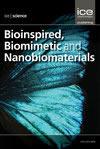A Histopathological Evaluation of Amino Acids-Capped Silver Nanoconjugates (AgNCs) Against Cadmium-Induced Toxicity in Albino Mice
IF 0.6
4区 工程技术
Q4 ENGINEERING, BIOMEDICAL
引用次数: 0
Abstract
Various molecules may modify the surface chemistry of commonly used nanomaterials (NMs), resulting in the synthesis of novel and safer NMs. The current study was delineated to evaluate the in vivo toxicity profiling of the silver nanoconjugates (AgNCs) conjugated with different amino acids. The L-glycine capped-AgNCs exhibited toxicity and caused tissue damage, while L-cystine and L-tyrosine capped-AgNCs showed protective effects against cadmium-induced toxicity. L-cystine-capped-AgNCs performed well as compared to other amino acids-AgNCs. The level of serum creatinine, ALT, AST, ALP, and blood urea increased (p<0.05) in G2, G3, and G5 in comparison to G1 (control group). While an increase in bilirubin for G2 was statistically non-significant (p>0.05). The ALT and AST elevated (p<0.05) in G4, however, other serological parameters in G4 and G6 didn’t show any noticeable change in their values. Histological analysis showed disturbed and deformed cellular structures in liver and kidney tissues of G2, G3, and G5. However, G4 and G6 samples demonstrated minute changes in comparison to G1. It is concluded that L-cystine and L-tyrosine-capped-AgNCs exhibited protective effects and should be tested further for developing safer nanoconjugates for biomedical uses.氨基酸封端的银纳米缀合物(AgNCs)对镉诱导的白化小鼠毒性的组织病理学评价
各种分子可以修饰常用纳米材料的表面化学性质,从而合成新的、更安全的纳米材料。本研究旨在评价不同氨基酸偶联银纳米偶联物(agnc)的体内毒性。l -甘氨酸盖顶的agncs表现出毒性并引起组织损伤,而l -胱氨酸和l -酪氨酸盖顶的agncs对镉诱导的毒性表现出保护作用。l -胱氨酸- agnc与其他氨基酸- agnc相比表现良好。血清肌酐、ALT、AST、ALP、尿素升高(p0.05)。G4组ALT、AST升高(p<0.05),而G4、G6组其他血清学参数无明显变化。组织学分析显示G2、G3和G5的肝、肾组织细胞结构紊乱和变形。然而,与G1相比,G4和G6样品表现出微小的变化。综上所述,l -胱氨酸和l -酪氨酸包裹的agnc具有保护作用,应进一步测试以开发更安全的生物医学用途纳米偶联物。
本文章由计算机程序翻译,如有差异,请以英文原文为准。
求助全文
约1分钟内获得全文
求助全文
来源期刊

Bioinspired Biomimetic and Nanobiomaterials
ENGINEERING, BIOMEDICAL-MATERIALS SCIENCE, BIOMATERIALS
CiteScore
2.20
自引率
0.00%
发文量
12
期刊介绍:
Bioinspired, biomimetic and nanobiomaterials are emerging as the most promising area of research within the area of biological materials science and engineering. The technological significance of this area is immense for applications as diverse as tissue engineering and drug delivery biosystems to biomimicked sensors and optical devices.
Bioinspired, Biomimetic and Nanobiomaterials provides a unique scholarly forum for discussion and reporting of structure sensitive functional properties of nature inspired materials.
 求助内容:
求助内容: 应助结果提醒方式:
应助结果提醒方式:


